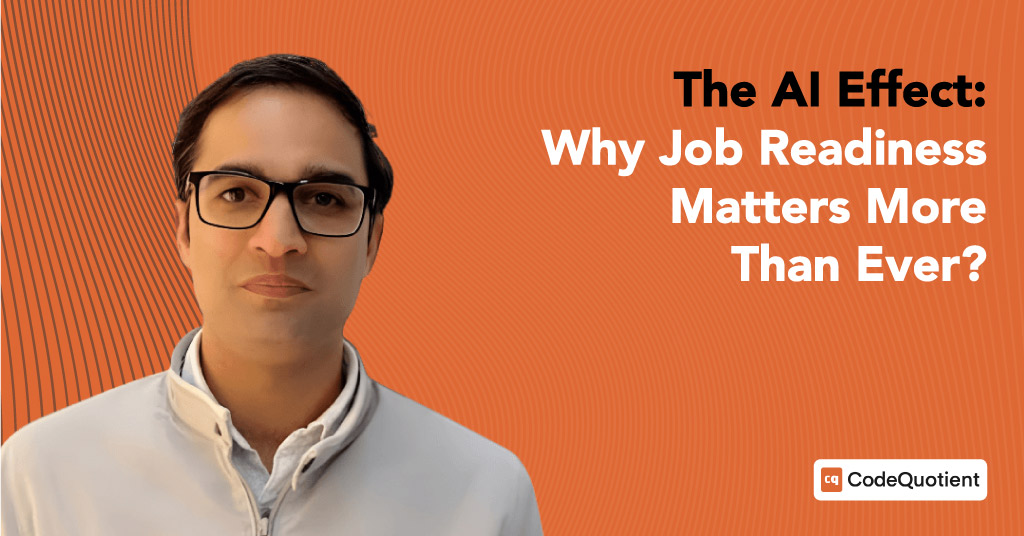AI is reshaping industries at an unprecedented rate—automating routine tasks and revolutionizing everything from customer service to manufacturing. But this rapid change also begets a widespread notion that AI will replace the human workforce.
Before we get into determining whether this is true, let us remember a befitting quote from the economist Richard Baldwin.
“It’s not AI that is going to take your job”, he says, “but someone who knows how to use AI might.”
Baldwin’s point is clear: it’s not AI itself that will disrupt your career—it’s how prepared you are to use it. In this rapidly evolving landscape, proficiency in AI tools will soon define success, becoming a must-have skill across industries.
While these factors are beyond your control, all you can do as a student is efficiently utilize the time you have.
Now, what can you do to improve your job readiness and employability? Let us take an elaborate look at this.
What Is the Impact of AI on Job Readiness?
In a rapidly evolving world, the skills demanded change often and the graduates must have the ability to adapt accordingly.
A Forbes report indicates that half of the on-demand skills today will be outdated in the next two years.
With AI automating the standard, manual tasks, there will be a new suite of roles demanding different skills. Therefore, students may have to re-adjust their skills and reinvent their career trajectories.
The World Economic Forum report shows that young people may have 12-15 different pathways during their work lives. This would mean a new role and job every 3 to 4 years.
So I think the takeaway is clear: the workforce must be prepared to embrace change and upskill and reskill constantly to meet the industry demands.
As we move toward a future dominated by AI, another critical issue emerges: the growing gap between what graduates know and what the industry needs.
The Other Concern: The Widening Skill Gap
While AI may impact the employment pattern and the skills needed, it may not be the sole factor responsible for job losses.
The main reason lies in the gap between the skillset possessed by the graduates and those sought by the industry. The AI penetration has only spotlighted the fundamental, ongoing issue, the lack of job readiness.
For instance, as per the India Skills Report 2015, hardly 1/3rd of the graduates entering the workforce meet the employment expectations and criteria.
Another notable issue is that the graduates lack hands-on experience and exposure to real-world problems. If companies have to spend a significant chunk of their costs and time on training the freshers who have already spent 3-4 years in training for a degree, anyone would want to protect their costs.
I believe such gaps in job readiness must be addressed during the course of their education.
How Can Students Improve Their Employability in the Age of AI?
Now, one may ask, how can students start working on enhancing their competitiveness?
From my decade-long experience in building CodeQuotient and seeing their issues first-hand, I think here is what they must focus on:
1. Enhancing real-world skills
I understand that students are overburdened with academic curriculum and exams. However, the truth is that the real world demands a lot more than what is taught inside classrooms.
Invest your time wisely to upskill and reskill continuously. Look for opportunities and training programs that can give you hands-on experience.
2. Align your skills with the job market
As I said, the job market is rapidly evolving and so are the skills in demand. As students, you must always keep a tab of the skills employers expect today. Doing so would help align your learning and preparation with the demand.
3. Focus on a specific area
For students, everything seems like an opportunity and it is tempting to be a jack of all trades. However, employers often consider expertise in a specific area. So, dedicate your time to mastering the subject and tools in a discipline of your interest.
Definitely, I don’t mean that you should ignore everything else. But, focus on being a key expert and a go-to person in a subject that you are passionate about.
4. Effective communication and team skills
While subject matter expertise is important, team management and communication skills are equally important. Employers look for people who can not only excel on their own but are capable of contributing in a team setting.
So, students must practice sharing their ideas and thoughts in a formal group.
5. Explore internship opportunities
Internships are an opportunity to apply your classroom learning and enhance your problem-solving skills. Explore internship opportunities that align with your career goals and educational background. It will also help you build a professional network which would help during your job search.
Wrapping Up
The good news is that AI has brought to the spotlight, an issue that has remained among Indian graduates for so long. While its penetration is beyond the fringes of control, students must invest their time wisely to build real-world skills that will pay dividends in their careers.
On the other hand, educators must ensure that the curriculum and pedagogy align with the industry requirements. There must be a greater focus on industry-academia collaboration and openness in providing internship opportunities to the freshers.
I am confident that equipping the students with industry-relevant skills and effective time management would help them navigate the uncertainties of the job market.




